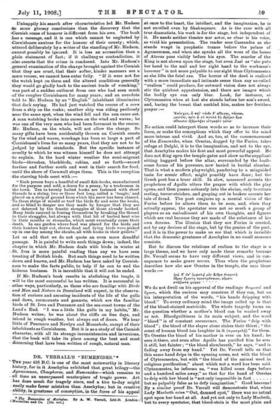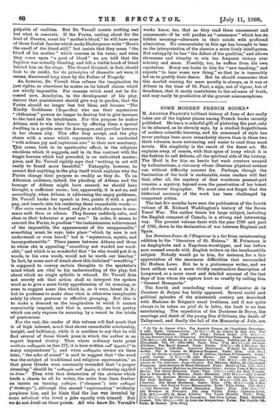DR. VERRALL'S "EUMENIDES."* "I'HE year 458 B.C. is one of
the most noteworthy in literary history, for in it Aeschylus exhibited that great trilogy—the • digamemnon, Chaephoroe, and Eumenides—which remains to . all time an tmatupassed masterpiece of tragic power. Art has done much for tragedy since, and a tiro to-day might: easily make fewer mistakes than Aeschylus; but in creativel • ability, in greatness of conception, in the force of his appeal:
* The Sumenizles of iEschylus. By A. W. Terra% Litt.D. •London : 1.240.emi1lan and Co. 110o. net.] at once to the heart, the intellect, and the imagination, he is not excelled even by Shakespeare. As is the case with all true dramatists, his work is-for the stage, but independent of it. He needs neither theatre nor actor, so clear is his voice, so vivid his presentation. The reader sees Cassandra as she stands wrapt in prophetic trance before the palace of Agamemnon, and when she speaks all the woes of the house of Atreus pass visibly before his eyes. The murder of the King is not shown upon the stage, but even Jael as "she puts her hand to the nail and her right hand to the workman's hammer" is not more palpable to our sight than Clytemnestra as she lifts the fatal axe. The horror of the deed is realised with a more immediate and intimate sense than any so-called "realism" could produce, for outward vision does not always stir the quickest apprehension, and there are images which the bodily eye can only blur. Look, for instance, at Clytemnestra when at List she stands before her son's sword, and, baring the breast that suckled him, makes her fruitless prayer :— 'Erie jos, Ira? TorSE.W ataeircu, Timmy, naarby, spbs al, rola& Sh PpiCcov Ap.a. orhotenv ItiAceltias firrpastAs "%IAA' No action could interpret these words so as to increase their force, or make the conceptions which they offer to the mind more intense and vivid. And so, too, at the commencement of the Eumenides, when Orestes, dogged by the Furies, takes refuge at Delphi, it is to the imagination, and not to the eye. that Aeschylus makes his first and most powerful appeal. He does-not fling open the temple-gates and show us theanppliaint sitting haggard before the altar, surromided by the loath- some forms of his pursuers, now buried in bestial slumber. That is what a modern playwright,,pandering to a misguided taste for scenic effect, might possibly have done ; but the Greek poet has a truer skill. In slow, measured Accents the prophetess of Apollo utters the prayer with which the play opens, and then passes solemnly into the shrine, only to return reeling, terror-stricken, and gasping out in broken accents her tale of dread. The poet conjuresnp _a mental vision of the Furies :before he allows them to be seen, and, when they actually appear, the spectator sees not so much a group of players as an embodiment ef his own thoughts, and figures which are real because they are made of the substance of his own dreams. The illusion that they are Furies is created, not by any devices of the stage, but by the genius of the poet, and it is in the power to make us see that which is invisible that, the dramatic greatness of Aeschylus in no small measure consists.
But to discuss the _relations of realism to the stage is a large theme, and we have only made these remarks because Dr. Verrall seems to have very different views, and in con- sequence to make grave errors. Thus when the .propheteas describes how she saw Orestes in the temple, she uses these words
4/7) r Op4?aA.43 gvapa 0E011Vilii apav gxorra wpocrrobraiov, apart ol-clCorra xeipas • • • • • We do not dwell on his approval of the readings deo/am-El and ;ram, which the curious may construe if they can, but on his interpretation of the words, "his hands dripping with blood." To every ordinary mind the image called up is that of the blood-stained matricide. The whole tragedy turns on the question whether a mother's blood can be washed away or not. Bloodguiltiness is its main subject, and the word "blood" is of constant recurrence. The Furies "drip with blood"; the blood of the slayer alone slakes their thirst ; "the scent of human blood has laughter in it (irporrycX4)" for them. To Orestes the blood of his mother is ever on his band; he sees it there, and even after Apollo has purified him he sees it still, but fainter ; "the blood slumbereth," he says, "and is fading away from my hand." Yet Dr. Verrall tells us that this same hand drips in the opening scene, not with the blood of Clytemnestra, but with "the blood of the animal used in
religious purification," about which not a word has been said Clytemnestra, he informs us, "was killed some days, before and a hundred miles away," so that for the hand of Orestes
to drip with her blood is "not only impossible in fact but so palpably false as to defy imagination." Good heavens! By a similar proof Dr. Verrall will demonstrate that, when Lady Macbeth cries "Out, damned spot," there was no actual spot upon her'hand-at all. And yet not only to Lady Macbeth, butte every spectator, that blood-stain is the most plain and
palpable of realities. But Dr. Verrall counts nothing real but what is concrete. If the Furies, casting about for the trail of Orestes, scent his "mother's blood," he will have none of those foolish fancies which make Shakespeare write "Here's the smell of the blood still," but insists that they mean "the blood of his mother" which courses in his veins ; and when they come upon "a gout of blood" we are told that the fugitive was actually bleeding, and left a visible track of blood behind him on the stage. The Grand Guignol, in fact, should look to its credit, for its principles of dramatic art were, it seems, discovered long since by the Father of Tragedy.
As, however, Dr. Verrall thus refuses the imagination its just rights, so elsewhere he makes on its behalf claims which are wholly impossible. For reasons which need not be dis-
cussed now, Aeschylus, in the development of his play, desires that punishment should give way to pardon, that the Furies should no longer ban but bless, and become "The Kindly Goddesses ('EvideviBer) who use their mysterious " chthonian " powers no longer to destroy but to give increase to the land and its inhabitants. For this purpose he makes Athena seek to win their favour by offering them a special dwelling in a grotto near the Areopagus and peculiar honours in her chosen city. This offer they accept, and the play closes with a scene which represents them as conducted "with solemn joy and rapturous awe" to their new sanctuary. This scene, both in its spectacular effect, in the religious emotions which it suggests, and in its fine contrast with the tragic horrors which had preceded, is an undoubted master- piece, and Dr. Verrall rightly says that "nothing in art will easily be found more beautiful." Unhappily, however, be cannot find anything in the play itself which explains why the Furies change their purpose so readily as they do. To an Athenian audience, indeed, the pleading of Athena and the homage of Athens might have seemed, we should have thought, a sufficient cause ; but, apparently, it is not so, and accordingly, when Athena is addressing the angry goddesses, Dr. Verrall hacks her speech in two, prints it with a great gap, and inserts into his rendering these remarkable words :— " Her voice ceases to be heard, and for a while she seems to com- mune with them in silence. They become suddenly calm, and show in their behaviour a great awe." In order, it seems, to convert the Furies, to produce " the instantaneous achievement of the impossible, the appeasement of the unappeasable," something must, he says, take place "which by men is not -understood or even heard," but is "mysterious, mystic, and incomprehensible." There passes between Athena and those to whom she is appealing "something not worded nor word- able," and which is so wonderful that "he who would put it in Words, in his own words, would not be worth our hearing." In fact, by some sort of dumb-show this italicised "something" is supposed to convey certain thoughts to the spectator's mind which are vital to his understanding of the play, but about which no single syllable is uttered. Dr. Verrall does not merely ask that action shall so interpret the spoken word as to give a more lively apprehension of its meaning, or even to suggest some idea which is, as it were, latent in it ; but he professes to make clear what is otherwise inexplicable solely by clever gestures or effective grouping. But this is to make a demand on the imagination to which it cannot conceivably respond, and that is, assuredly, no true poetry which can only express its meaning by a resort to the tricks of pantomime.
For the rest, the reader of this volume will find much that is of high interest, much that shows remarkable scholarship, insight, and brilliancy, while it is needless to say that he will find several of those Greek puns in which the author is an expert beyond rivalry. Thus where ordinary texts print iroXXoZr icaeappoi;s in line 277, it is here written Katr cippoifrs ("in many conjunctures "); and when KaBappihr occurs six lines later, "the echo of sound" is said to suggest that " the word was the subject of traditional and religious equivocation," so that pious Greeks were constantly reminded that "a proper cleansing" should be "Ka6appOr xa0' rippOv, a cleansing applied in time." Then with that detestation of the obvious which lends a charm to all he writes, the critic four lines further on insists on turning na0aipte (" cleanses") into sca&upEi (" destroys "), although this second "equivocation" evidently perplexes him, and he hints that the line was invented by some scholiast who loved a joke equally with himself. But we do not dwell on these points. All who know Dr. Verrall's works know, too, that as they read them amusement and amazement—if he will pardon an " assonance " which has no hidden meaning—alternate in their minds with profound admiration. No commentator in this age has brought to bear on the interpretation of the classics a more lively intelligence. But unhappily he has "the defect of his qualities," and allows cleverness and vivacity to win too frequent victory over sobriety and sense. Possibly, too, he suffers from his own reputation. Every one looks to him for "new teaching," and expects "to hear some new thing," so that he is insensibly led on to gratify their desire. But he should remember that this morbid craving for mere novelty is always, as it was at Athens in the time of St. Paul, a sign, not of vigour, but of decadence, that it rarely contributes to the advance of truth, and may easily be productive of the gravest misconceptions.







































 Previous page
Previous page